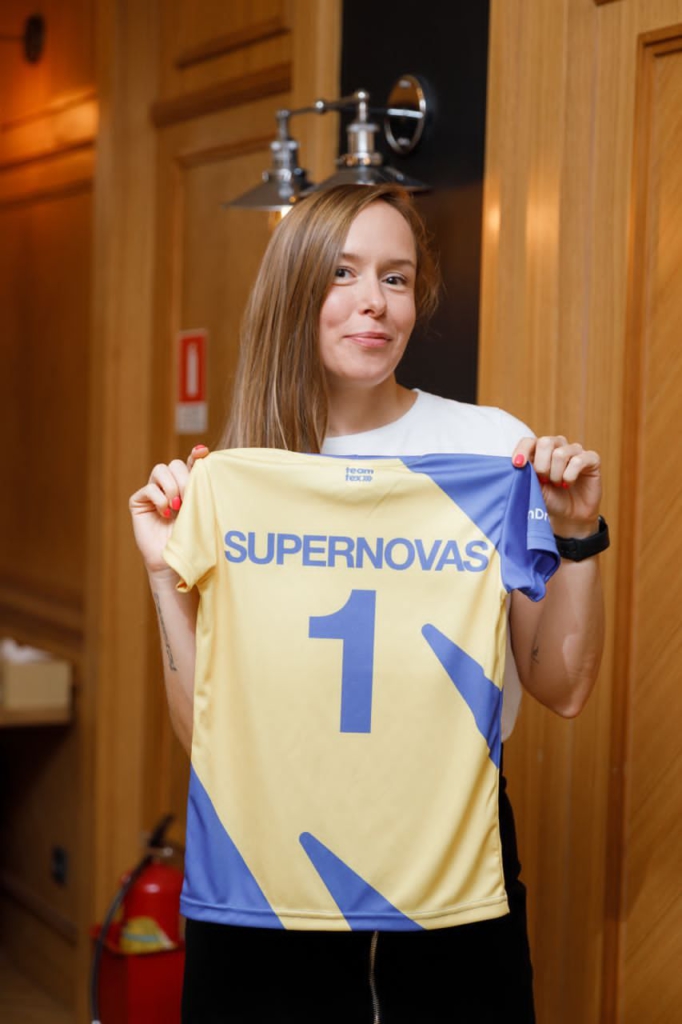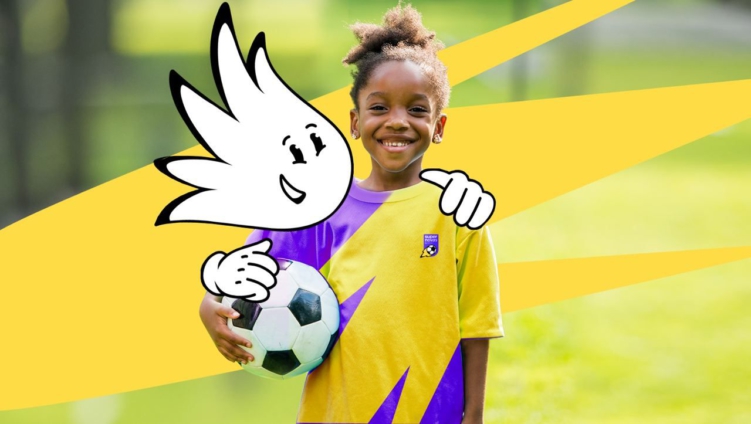Supernovas is a global non-profit initiative launched by inDrive that is striving to engage children in sport, and they’re on the lookout for people to become coaches. Anna Fedorchuk, head of the Supernovas project, told us about the project, the qualities they’re looking for in a coach – and why.
Please tell us about the project.
Supernovas is an international non-profit football project aimed at benefiting children in small towns and villages. By engaging children in football, we want to help them to develop both physically and socially. The project is financed by inDrive – a US global mobility and urban services platform.
We’re looking for people who love both children and football, and would like to train kids several times a week. For our project, the coach is a key figure, someone who can create a comfortable, safe and friendly environment, who can inspire a love of football in children, and work with them for the good of the community. Fun, safety and the children’s comfort come first for us, rather than winning.
Both men and women can coach for us, and you don’t have to be a football player or a professional coach to apply. We will teach the selected candidates everything. Rather, it’s important that applicants are interested in football, patient, and able to communicate well with children. If a coach is inspired to develop their community and create better opportunities for children – then he or she is the person we’re looking for! At the same time, our project has certain basic values that everyone must follow: for example, no shouting at children under any circumstances. We don't grade kids, and we don't punish them for mistakes that are a normal part of the learning process and life in general. We believe that comparing children with each other is harmful.

Our coach should create a friendly atmosphere during training and remember that the most important thing is the process, not the result. We teach children how to play football and enjoy doing it; it doesn't matter whether they eventually become professional football players or not. It is important to find ways to work with everyone and show how important uniqueness is.
This is a paid position: Coaches will be paid depending on the number of groups they train and the amount of time spent with them. We assume that this will not be the coach’s main source of income, but we strive to pay a higher salary per hour than an average children’s football coach usually gets in a certain country.
From May 5 to June 5 2023, anyone interested in joining the project as a coach can apply on our website. After reviewing applications, we will contact suitable candidates and conduct interviews to learn more about their experience, motivation and approach to training. The finalists will then go through another stage of interviews with our methodologist.
After we’ve found our coaches, we will rent sports grounds and buy the necessary equipment and kit. We will then draw up a schedule, and that's it – training can begin, and all interested children are welcome to join.

You said that anyone can become a coach. However, given that this job entails working with children, how do you ensure their safety?
Safety is, of course, the most important thing for us. Applicants undergo several interviews, as well as a security check. Moreover, our project requires that coaches undergo mandatorysupervision with psychologists. We will also ensure an open channel for feedback from children and their parents.
At what stage is the project now?
We have already started the project in Kazakhstan, and are now opening schools in other countries. In Ghana, this is the first call for coaches. Everyone can apply, and I urge people to do so. This can be done on our website: https://supernovas.indrive.com/. We feel that there is great potential for our initiative here.
How do you train coaches?
We have our own ideas on how to approach training. As I said, it is important to us that the children’s enjoyment comes first, and results second. I COACH KIDS, an established expert in the training of grassroots sports coaches and our partner in this regard, adheres to the same philosophy. We agree with the principles they recommend; they will prepare methodological recommendations for training and run courses for all our coaches. In the future, their methodologists will communicate monthly with our coaches and help in their development.
The requirements for coaches are clear. How are the project participants selected? Are there any criteria?
In Ghana, we consider applications from all localities except Accra. There are quite a lot of football schools and academies in the capital, and we would like children to have equal opportunities, whether they were born in a big city or a small one.
We recruit children aged 5 to12 years. (But again, if a 4-year-old child wants to practice and comes to us for training, we won’t turn them away.) The upper age limit is set by the fact that this is when children begin to play football more competitively and go to special schools. They can also organize themselves to play with other children, which makes the format of our section less important for them. According to FIFA recommendations, this is also when it becomes necessary to divide children into women's and men's teams.
For now, we want to keep to the principle that we are ‘for everyone’, both girls and boys. Nationality, religion and social status are not important to us. What matters is that children learn openness and acceptance of diversity.
Why did you choose football?
It's one of the world’s favorite sports, as well as a great way to learn to be part of a team. We will include other sports andactivities as our project develops.
So far, everything looks rosy. Do you face any difficulties in implementing the project?
We do, of course. When we first started, we thought that the biggest problem would be finding venues for training. However, these exist – although they vary in quality and condition.
What is difficult is finding the right people to serve as coaches. People are used to the idea that a coach is harsh and demanding, a professional aimed at success at any cost. Also, people are sometimes afraid of something new; an unusual approach. But we hope that people in Ghana are open to new experiences.
Many potential coaches are skeptical: they don’t believe that we will buy all the equipment, organize everything, provide training, and also pay salaries. It's very difficult to make people believe you. We’ve had some candidates that we really liked, but who disappeared at the final stage. They just stopped answering our phone calls. I would really like to call them and ask: ‘What happened? Why?’
I hope that once Supernovas is familiar and fully operational, this distrust will be overcome. Look at our photos from Kazakhstan and you will believe that this is all for real.
What are your plans for development in Ghana, and in general?
Right now, we are collecting applications from future coaches. We hope that there will be quite a lot of them. Anyone who is interested can apply on our website.
I believe that Ghana is a very promising country. We would like to contribute to the development of grassroots football here and improve children’s lives. We know that football is the most popular sport in the country, and that there are a lot of good football players. As I’ve said, we are not aiming to make children into professional football players, but we will of course be glad if their playing football for fun leads them to become the next ‘Black Satellites’!
In the future, the project will appear in other countries around the world. We will expand through various interesting ways to engage children and adults in football and other sports activities.
Why did inDrive take on this project?
The mission of the company, our DNA, is challenging injustice. This applies not only to our business, but also to our non-commercial initiatives. We systematically look for areas where there is a high level of injustice and then try to provide more honest, fair and equal opportunities. For us, giving children in small settlements the opportunity to play sports for fun is just fair!
If you had to explain the essence of Supernovas, what would it be?
At the very beginning of the I COACH KIDS training, they say that the main goal of a coach is to ignite the fire of love for football in the hearts of children, and help them carry it through their lives. That’s what we want to do. Our mascot, Sparky, symbolizes this spark, and our name, “Supernovas”, says that we are ready to change this universe. By the way, inDrive’s motto is ‘people driven’, and I think that this is what we are talking about: the drive and love for sports that football gives. We want people to remember this when they become adults.
Latest Stories
-
Constitution isn’t broken, but it needs a service – Former Chief Justice Sophia Akuffo
19 minutes -
Miner, 23, fined for receiving payments through electronic medium falsely
1 hour -
Norrie apologises after thrown racquet hits spectator
2 hours -
Ex-Chief Justice calls for review of ‘Imperial Presidency’ in the Constitution
2 hours -
Former CJ Sophia Akuffo challenges Akufo-Addo’s stance on constitution’s perfection
2 hours -
Djokovic and Murray join forces in Melbourne
3 hours -
‘It’s tricky, they fly a lot’ – Arteta on Carabao Cup balls
3 hours -
Newcastle win at Arsenal to take control of EFL Cup semi-final tie
3 hours -
Even Salah would struggle at Spurs – Postecoglou
3 hours -
Facebook and Instagram get rid of fact checkers
4 hours -
Trudeau says ‘not a snowball’s chance in hell’ Canada will join US
4 hours -
Europe leaders criticise Musk attacks
4 hours -
Search goes into night for survivors of Tibet quake
5 hours -
NPP must rise again, says former Deputy Housing Minister
5 hours -
Dr Prince Hamid Armah: Eight years, 2 different stories
5 hours

